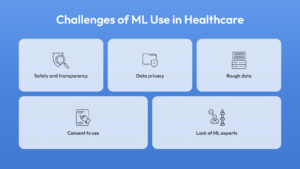Lifestyle and Tech is at the forefront of current news and trends covering business, technology, personal finance, travel, fashion and smart living. We aim to deliver quality content that inspires your life and influences the way you decide to live it
Why Machine Learning is the Future of Personalized Medicine in Healthcare
Machine learning has the ability to totally transform the healthcare industry by employing data analysis from several sources to enhance patient outcomes and simplify operations. However, this technology has a number of drawbacks that non-technical persons could find challenging to manage.
This article discusses the potential, challenges, and applications of machine learning in the healthcare sector as well as how it impacts the provision and administration of medical treatment.
How Machine Learning is Transforming Healthcare
Machine learning is a technology allowing computers that are not explicitly trained to examine data and identify patterns. Essentially, it enables machines to autonomously and individually adapt to patterns and make conclusions based on the data provided to them.
Machine learning algorithms are utilized in healthcare for a variety of applications such as spam email filtering, image object recognition, and complex dataset analysis. This technology is beneficial for efficiently analyzing large amounts of patient data in healthcare and identifying patterns that may be overlooked by human researchers.
The increasing access to patient data has resulted in a rise in machine learning usage in the healthcare sector. Machine learning can aid healthcare professionals in analyzing extensive datasets, potentially leading to more accurate diagnoses, customized treatment strategies, and enhanced patient results, ultimately driving advancements in public health.
Medical solutions involving the management and analysis of massive volumes of data are heavily dependent on machine learning. When patterns and insights are difficult to find manually, it assists healthcare practitioners in identifying them.
Machine learning is being used more frequently in healthcare to improve care and patient results by taking a predictive approach. It is used in a variety of healthcare applications, such as automating billing, developing clinical guidelines, and providing decision support.
Predictive Medicine and Machine Learning: Benefits of an Integrated Approach
Machine learning technology can provide significant advantages for healthcare organizations looking to enhance their services. Consider the benefits for adopting ML technology in your healthcare business.
Improving processes through automation
Machine learning is used in the healthcare industry to improve operations. It analyzes large amounts of medical data to create personalized treatment plans. This enhances patient care by making it more efficient and effective. Machine learning can automate tasks like resource management and staff scheduling. This leads to higher efficiency and better patient care quality.
Customized treatment plans
Technology like ML makes it possible to analyze patient data and create customized treatment plans based on a person’s genetic composition, lifestyle, medical background, and other variables.Therapies and patient outcomes may be enhanced by the use of sophisticated machine learning in healthcare data research.
Cost savings
Machine learning is a valuable tool for healthcare organizations as it can automate tasks, improve accuracy, and reduce medical errors associated with manual labor. It also allows for early detection of individuals at risk for chronic conditions, leading to timely interventions and potential cost savings in the long run.
Improved patient satisfaction
Machine learning technology has the ability to enhance patient pleasure and improve results by providing individualized treatment, cutting down on wait times, and minimizing medical mistakes in healthcare facilities.
Forecasting the likelihood of illnesses
The use of machine learning in healthcare data analysis can help develop disease prediction models that can enhance risk assessment and disease prevention. These models provide precise predictions, assisting in making well-informed choices regarding disease management and prevention.
Enhanced public health
Machine learning healthcare companies utilize patient data patterns and trends to improve population health outcomes. ML programs can identify patients at high risk for chronic conditions, enabling targeted interventions to prevent the spread of disease.
Improving safety measures
Machine learning algorithms are able to forecast patient risks, including pharmaceutical side effects and difficulties after surgery. Patient dangers may be decreased and the security of medical operations can be improved by putting safety measures in place.
The use of ML in healthcare, particularly within medical imaging software development, has the potential to significantly enhance care quality, reduce expenses, and boost patient satisfaction, leading to positive results for both patients and healthcare organizations.
Examining the Limitations and Risks of Machine Learning in Healthcare
Machine learning provides key benefits in healthcare, enhancing patient results and operational effectiveness. Yet, healthcare institutions encounter obstacles during the integration of machine learning technologies.

Partnering with a vendor experienced in this field can be transformative to solve the above challenges. The vendor’s expertise can guide you through the complexities, ensuring successful implementation and unlocking the full potential of machine learning to revolutionize patient care, optimize operations, and drive positive outcomes for your healthcare institution.
Wrapping Up
This post contains only the basics of how ML can transform healthcare establishments’ activity. If you want to delve deeper and explore the full potential of ML integration into your healthcare software, contact a skilled healthcare software development vendor with expertise in working with machine learning algorithms. The vendor’s specialists can provide tailored solutions, address specific challenges, and guide you through the implementation process, ensuring you unlock the transformative power of ML to revolutionize patient care and achieve optimal results for your healthcare institution.
